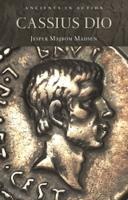
Bloomsbury (2019) h/b 133pp £18.99 (ISBN 9781350033375)
Cassius Dio was a Greek from Bithynia, as well as a Roman citizen and a member of Rome’s élite. His father Cassius Apronianus was a senator, consul and provincial governor. Dio followed in his father’s footsteps. He started as a quaestor at some point in the reign of Commodus. He rose through the cursus honorum to become a consul. He accompanied Caracalla to Asia Minor in the Emperor’s entourage. He served as curator of Pegamum and Smyrna from AD 218 to 222, then as governor of Africa, Dalmatia and finally Pannonia. As a senator and participant in Roman politics in the late second century and early third century, he was able to write about current affairs on the basis of personal knowledge.
Dio’s Roman History covers the period from Rome’s foundation until AD 229. It is our most important source for the second century and early third century. The first twenty-four books survive in a fragmentary state. Books 36 to 60 are well preserved. They cover the period from the early 70s to Claudius’ reign. The last 30 books (61 to 80) only survive in the form of excerpts collected by the Byzantine scholar, Xiphilinus.
This book begins with a helpful account of Dio’s life and work. The author then turns to a closer analysis of his writings. Dio had a clear agenda. He regarded monarchy, that is rule by a king or emperor, as the best form of government and democracy as the worst. He justified this because ‘it is easier to find one good man than many’ (book 44.2.1-2) and the masses have no part in acquiring virtue. He accepted that some monarchs performed badly, but even so that was better than rule by the masses. Dio characterised Caesar as a good monarch, despite his faults, and roundly condemned Caesar’s assassination. He saw Augustus as an ideal emperor, who delivered Rome from the chaos of a failed republic and two civil wars. Dio was realistic in his assessment of subsequent emperors, highlighting the inadequacies of some such as Caligula, Nero, Domitian and Commodus. He spoke highly of Vespasian and characterised Marcus Aurelius as a model emperor.
Roman History book 52 contains a fictitious dialogue between two of Octavian’s friends, Maecenas and Agrippa, in Octavian’s presence. They are discussing the different forms of government and whether or not the republican system should be reintroduced. Maecenas argues that the best constitution is one where the emperor has unrestricted powers, both making the laws and implementing them. The role of the Senate is to advise, and the good emperor listens to advice. Maecenas is expressing Dio’s view.
Dio sees history as a cyclical process. Democracy, certainly in its restricted Roman republican form, is effective for a time. But eventually, as powerful figures vie for supreme power putting their own interest above the national interest, chaos ensues until eventually monarchs emerge to restore stability, law and order. This, according to Dio, is what happened in the first century BC. (If Dio were alive today, he might apply a similar analysis to the conduct of certain modern politicians.)
As the author points out, it is an oddity that Dio was such a firm advocate of monarchy, despite his own life experiences. He lived through the reign of Commodus; the civil war between Severus, Niger and Albinus; the reign of Severus, whom Caracalla tried to murder; the reign of Caracalla, who murdered his brother, and Caracalla’s inadequate successors. Through all these troubled years Dio was member of the political establishment, witnessing events at first hand.
The author traces how Dio uses ‘Roman narratives’ to articulate his view of history. The early and middle republic come across as stable periods. The late republic becomes progressively more chaotic, as the leading figures compete for high office and expanded military commands. In the concluding section, the author discusses how and to what extent Dio published his work during his lifetime. Certainly, the early books would have caused no offence to anyone. But the later books, if put into general circulation, might have put Dio into hot water.
This handy little book is an excellent introduction for anyone who is reading Dio’s Roman History. It has certainly made this reviewer look at Dio’s work in a new light.
Rupert Jackson
